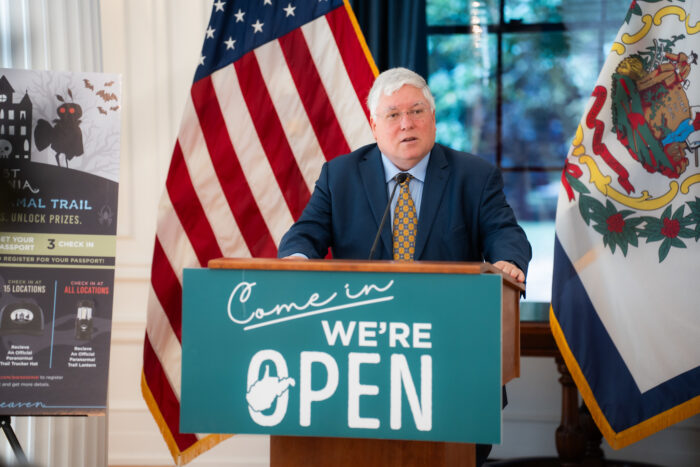Your browser doesn't support audio playback.
State officials are redoubling efforts to ensure tourism to West Virginia remains strong despite the ongoing federal government shutdown.
Last week Gov. Patrick Morrisey announced the state would spend close to $100,000 to keep its two national parks – New River Gorge and Harpers Ferry – open through Oct. 17.
Thursday he announced a 20% discount to any visitor who books a three day stay in a state park through Dec. 30.
Morrisey said he is trying to mitigate the impact of a federal government shutdown on local businesses during one of the state’s busiest tourism seasons.
“Think about how many hotel rooms are booked, how many restaurants are booked. How many of the smaller stores get business from all the people that are coming in from within our state and across the country,” he said. “That’s not something you want shut down. I strongly condemn the political gridlock in Washington that’s led to the Schumer shutdown, but we’re not going to allow the people of West Virginia to suffer from that.”
Bridge Day, which promotes itself as “West Virginia’s largest single-day festival,” is Oct. 18, the day after state funding to keep New River Gorge National Park open ends. But Morrisey said he has high confidence the event will “go on unhitched.”
He was joined during his press conference by Jeremy Jones, director of the West Virginia Division of Forestry, and Chelsea Ruby, cabinet secretary of the state Department of Tourism, to further emphasize why people should visit West Virginia. Jones reported that fall foliage has been delayed due to weather conditions but expected to peak soon.
Ruby highlighted the economic impact of tourism, noting $18 million daily spent in October. She also discussed the state’s paranormal trail, which has added four new sites in its second year.
Other Business
The governor also discussed the West Virginia Supreme Court of Appeals vacancy created by the death of Justice Tim Armstead in August. Armstead was elected to a 12-year term that began Jan. 1, 2021. Morrisey said his replacement will serve at a minimum until May of 2026, when the next judicial elections will take place.
Morrisey said at least 12 people have already submitted their applications to the Judicial Vacancy Advisory Commission.
“According to the state code, there’s some time restrictions put in place in terms of when I need to make the pick,” Morrisey said. “But right now, the applications are in and then from the date that we received the applications, there are 30 days to make the appointment. So we’re going to be proceeding.”
An announcement related to President Donald Trump’s initiative to extend the reasonable useful life of coal fire power plants was also teased, despite recent reports from Appalachian Power indicating their plans to move away from coal in the coming years and industry reports that both natural gas and renewables have overtaken coal.
“We’ve been working closely with a number of different folks about how we can continue to keep existing power generation and grow that as well,” Morrisey said. “And we are appreciative of the President for what he’s doing and his plan, and we believe, given the conversations I’ve had with the Department of Energy and the National [Energy] Dominance Council that the President has put together, that there’s a chance to do some really incredible things that extends that reasonably useful life out.”
The governor also answered questions regarding the local impact of the federal government shutdown, as well as the effects of the Rural Health Transformation initiative in the Big Beautiful Bill. Morrisey called concerns over cuts to Medicaid and rural health services “fake news.”
“We know that there are changes that may be coming into place, but there’s a way we can address some of it up front,” he said. “I think it’s really important for people to know that if we engage with the Rural Health Transformation the right way, the goal was to move the needle from a healthcare outcome perspective.”
Morrisey emphasized the bill’s potential to mitigate Medicaid cuts and improve healthcare outcomes. But analysis from various organizations has indicated at least seven rural hospitals are at risk of closure due to the cuts in the bill.
